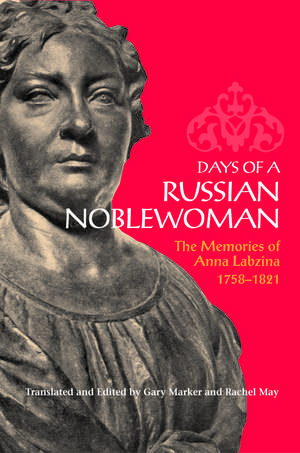Days of a Russian Noblewoman – The Memories of Anna Labzina, 1758–1821: NIU Series in Slavic, East European, and Eurasian Studies
Autor Anna Labzina, Gary Marker, Rachel Mayen Limba Engleză Paperback – 31 iul 2001
Providing a unique glimpse into the domestic life of Russia's nobility in the late eighteenth and early nineteenth centuries, Days of a Russian Noblewoman combines a rare memoir and a diary, now translated into English for the first time. Anna Labzina was relatively well educated by the standards of her day, and she traveled widely through the Russian empire. Yet, unlike most writers of her time, she writes primarily as a dutiful, if inwardly rebellious, daughter and wife, reflecting on the onerous roles assigned to women in a male-centered society.
Labzina was married young to Alexander Karamyshev, who, while well regarded in political and scholarly circles of his day, proved to be brutish and abusive at home. A "Russian Voltairian," he professed atheism and free love. His unbridled behavior caused Labzina much grief, which she vividly recalls in her memoir. Because she moved among aristocratic circles, her reminiscences bring readers face to face with celebrated figures of politics and literature, including the Empress Catherine the Great and the "Radiant Prince" Grigorii Potemkin. As a pious and charitable woman, Labzina also speaks for others who rarely had a voice in literature: serfs, prisoners, and political exiles.
Labzina wrote both her memoir and her diary during her second marriage, to Alexander Labzin, a leader in Russian Freemasonry and in the movement for religious revival. At the same time, she became actively involved in the spiritual life of his lodge, the Dying Sphinx. Her account of her spiritual development and her social sphere offer unparalleled insights into male and female sensibilities of the time.
Labzina was married young to Alexander Karamyshev, who, while well regarded in political and scholarly circles of his day, proved to be brutish and abusive at home. A "Russian Voltairian," he professed atheism and free love. His unbridled behavior caused Labzina much grief, which she vividly recalls in her memoir. Because she moved among aristocratic circles, her reminiscences bring readers face to face with celebrated figures of politics and literature, including the Empress Catherine the Great and the "Radiant Prince" Grigorii Potemkin. As a pious and charitable woman, Labzina also speaks for others who rarely had a voice in literature: serfs, prisoners, and political exiles.
Labzina wrote both her memoir and her diary during her second marriage, to Alexander Labzin, a leader in Russian Freemasonry and in the movement for religious revival. At the same time, she became actively involved in the spiritual life of his lodge, the Dying Sphinx. Her account of her spiritual development and her social sphere offer unparalleled insights into male and female sensibilities of the time.
| Toate formatele și edițiile | Preț | Express |
|---|---|---|
| Paperback (1) | 199.10 lei 6-8 săpt. | |
| MB – Cornell University Press – 31 iul 2001 | 199.10 lei 6-8 săpt. | |
| Hardback (1) | 702.21 lei 6-8 săpt. | |
| Northern Illinois University Press – 31 iul 2001 | 702.21 lei 6-8 săpt. |
Din seria NIU Series in Slavic, East European, and Eurasian Studies
-
 Preț: 233.55 lei
Preț: 233.55 lei -
 Preț: 133.36 lei
Preț: 133.36 lei -
 Preț: 187.47 lei
Preț: 187.47 lei -
 Preț: 147.90 lei
Preț: 147.90 lei -
 Preț: 128.78 lei
Preț: 128.78 lei -
 Preț: 214.62 lei
Preț: 214.62 lei -
 Preț: 223.69 lei
Preț: 223.69 lei -
 Preț: 285.22 lei
Preț: 285.22 lei -
 Preț: 125.08 lei
Preț: 125.08 lei -
 Preț: 351.48 lei
Preț: 351.48 lei -
 Preț: 216.00 lei
Preț: 216.00 lei -
 Preț: 187.69 lei
Preț: 187.69 lei -
 Preț: 182.10 lei
Preț: 182.10 lei -
 Preț: 185.24 lei
Preț: 185.24 lei -
 Preț: 133.36 lei
Preț: 133.36 lei -
 Preț: 96.48 lei
Preț: 96.48 lei -
 Preț: 106.49 lei
Preț: 106.49 lei -
 Preț: 255.61 lei
Preț: 255.61 lei -
 Preț: 193.11 lei
Preț: 193.11 lei -
 Preț: 211.82 lei
Preț: 211.82 lei -
 Preț: 172.41 lei
Preț: 172.41 lei -
 Preț: 115.79 lei
Preț: 115.79 lei -
 Preț: 234.64 lei
Preț: 234.64 lei -
 Preț: 111.73 lei
Preț: 111.73 lei -
 Preț: 179.01 lei
Preț: 179.01 lei -
 Preț: 215.93 lei
Preț: 215.93 lei -
 Preț: 214.88 lei
Preț: 214.88 lei -
 Preț: 177.42 lei
Preț: 177.42 lei -
 Preț: 169.95 lei
Preț: 169.95 lei -
 Preț: 255.54 lei
Preț: 255.54 lei -
 Preț: 155.16 lei
Preț: 155.16 lei -
 Preț: 278.06 lei
Preț: 278.06 lei -
 Preț: 135.38 lei
Preț: 135.38 lei -
 Preț: 196.94 lei
Preț: 196.94 lei -
 Preț: 201.51 lei
Preț: 201.51 lei -
 Preț: 185.81 lei
Preț: 185.81 lei -
 Preț: 128.71 lei
Preț: 128.71 lei -
 Preț: 196.10 lei
Preț: 196.10 lei -
 Preț: 150.27 lei
Preț: 150.27 lei -
 Preț: 178.17 lei
Preț: 178.17 lei -
 Preț: 87.85 lei
Preț: 87.85 lei -
 Preț: 270.18 lei
Preț: 270.18 lei -
 Preț: 162.54 lei
Preț: 162.54 lei - 18%
 Preț: 214.39 lei
Preț: 214.39 lei -
 Preț: 128.06 lei
Preț: 128.06 lei -
 Preț: 186.19 lei
Preț: 186.19 lei
Preț: 199.10 lei
Nou
Puncte Express: 299
Preț estimativ în valută:
38.10€ • 40.08$ • 31.63£
38.10€ • 40.08$ • 31.63£
Carte tipărită la comandă
Livrare economică 16-30 ianuarie 25
Preluare comenzi: 021 569.72.76
Specificații
ISBN-13: 9780875805894
ISBN-10: 0875805892
Pagini: 202
Dimensiuni: 139 x 215 x 17 mm
Greutate: 0.28 kg
Ediția:1
Editura: MB – Cornell University Press
Seria NIU Series in Slavic, East European, and Eurasian Studies
ISBN-10: 0875805892
Pagini: 202
Dimensiuni: 139 x 215 x 17 mm
Greutate: 0.28 kg
Ediția:1
Editura: MB – Cornell University Press
Seria NIU Series in Slavic, East European, and Eurasian Studies
Recenzii
"Fascinating.... A valuable source for the study of Russian women's history."—Elise Kimerling Wirtschafter, author of Social Identity in Imperial Russia
"A valuable translation that offers telling insights on the ways in which historical forces intersected in the life and consciousness of a Russian noblewoman."—Alexander Martin, author of Romantics, Reformers, and Reactionaries
"A valuable translation that offers telling insights on the ways in which historical forces intersected in the life and consciousness of a Russian noblewoman."—Alexander Martin, author of Romantics, Reformers, and Reactionaries
Cuprins
Table of Contents Introduction by Gary Marker and Rachel May
The Memoir
The Diary
Appendix One: The Variant Beginning to Labzina's Memoir
Appendix Two: Freemasons' Ceremony
Notes
Index
The Memoir
The Diary
Appendix One: The Variant Beginning to Labzina's Memoir
Appendix Two: Freemasons' Ceremony
Notes
Index
Descriere
Providing a unique glimpse into the domestic life of Russia's nobility in the late eighteenth and early nineteenth centuries, Days of a Russian Noblewoman combines a rare memoir and a diary, now translated into English for the first time. Anna Labzina was relatively well educated by the standards of her day, and she traveled widely through the Russian empire. Yet, unlike most writers of her time, she writes primarily as a dutiful, if inwardly rebellious, daughter and wife, reflecting on the onerous roles assigned to women in a male-centered society.
Labzina was married young to Alexander Karamyshev, who, while well regarded in political and scholarly circles of his day, proved to be brutish and abusive at home. A "Russian Voltairian," he professed atheism and free love. His unbridled behavior caused Labzina much grief, which she vividly recalls in her memoir. Because she moved among aristocratic circles, her reminiscences bring readers face to face with celebrated figures of politics and literature, including the Empress Catherine the Great and the "Radiant Prince" Grigorii Potemkin. As a pious and charitable woman, Labzina also speaks for others who rarely had a voice in literature: serfs, prisoners, and political exiles.
Labzina wrote both her memoir and her diary during her second marriage, to Alexander Labzin, a leader in Russian Freemasonry and in the movement for religious revival. At the same time, she became actively involved in the spiritual life of his lodge, the Dying Sphinx. Her account of her spiritual development and her social sphere offer unparalleled insights into male and female sensibilities of the time.
Labzina was married young to Alexander Karamyshev, who, while well regarded in political and scholarly circles of his day, proved to be brutish and abusive at home. A "Russian Voltairian," he professed atheism and free love. His unbridled behavior caused Labzina much grief, which she vividly recalls in her memoir. Because she moved among aristocratic circles, her reminiscences bring readers face to face with celebrated figures of politics and literature, including the Empress Catherine the Great and the "Radiant Prince" Grigorii Potemkin. As a pious and charitable woman, Labzina also speaks for others who rarely had a voice in literature: serfs, prisoners, and political exiles.
Labzina wrote both her memoir and her diary during her second marriage, to Alexander Labzin, a leader in Russian Freemasonry and in the movement for religious revival. At the same time, she became actively involved in the spiritual life of his lodge, the Dying Sphinx. Her account of her spiritual development and her social sphere offer unparalleled insights into male and female sensibilities of the time.











